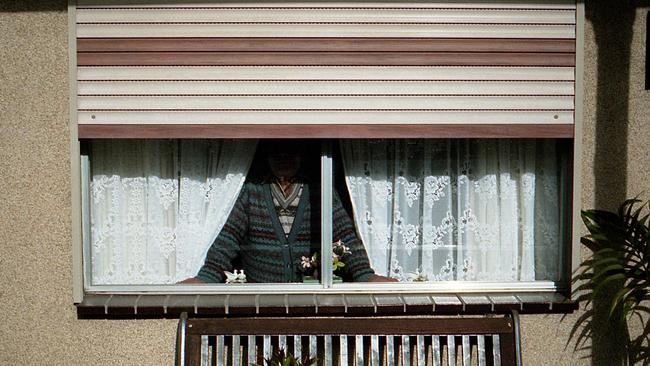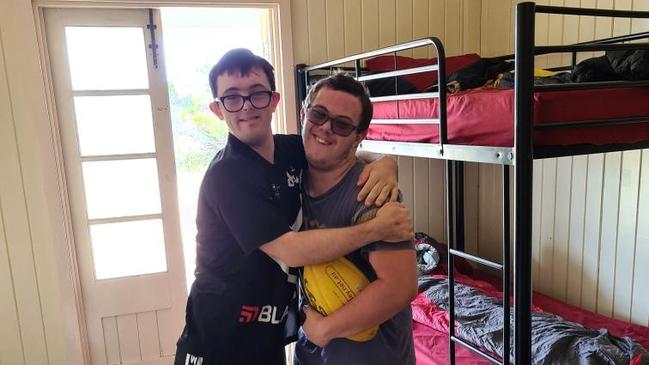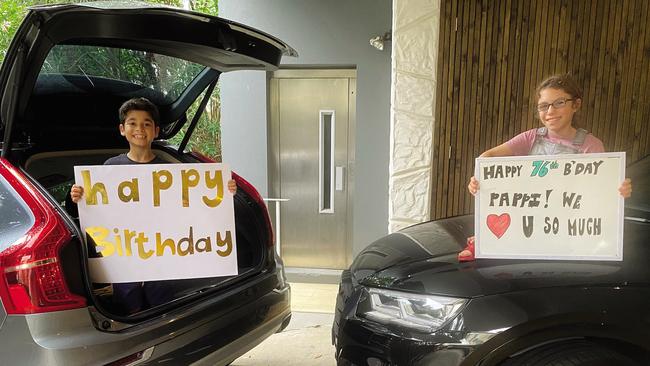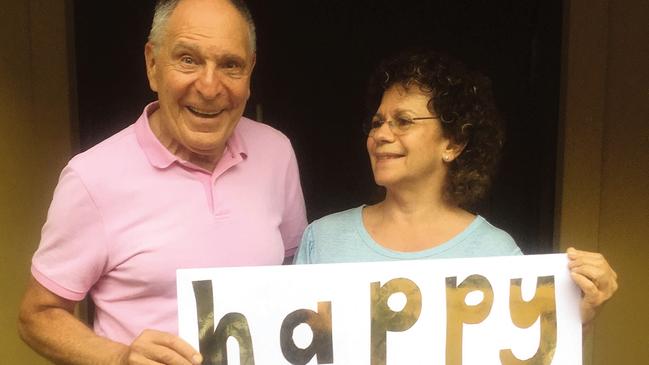Trent Dalton’s tales from the bunker: Inside the bubble
Society is fractured into millions of separate microcosms – but our yearning for connection will always find a way.

Hannah Brown discovered she was pregnant on Australia Day. She’s a 33-year-old Brisbane woman who’s been living in London for seven years with her husband. “We did our usual Aussies-in-London get-together this year for Australia Day,” she says. “Except now that we are in our 30s and married, a home-cooked sit-down lunch is the more respectable thing to do in celebration.”
Over lunch, Hannah and her friends reminisced on Australia Days past. Parties in Brisbane backyards. Lemon-coloured sunlight and straw hats and sweaty hugs. Games of “Goon of Fortune” where participants shared joyous glugs from the mouth of a fist-squeezed wine bag, germs be damned.
“On this particular Australia Day, I didn’t feel like drinking and that’s when I knew something was seriously up,” Hannah says. “Once we had got over the initial shock of, ‘How did this happen?’ – a ridiculous question for a 33-year-old and her nearly 40-year-old husband – my thoughts turned to my parents back in Brisbane who were going to be grandparents for the first time.”
Hannah thought of how she was going to reveal the news to her mum and dad. She booked a flight home to Brisbane, intending to surprise them in the flesh and hand them scratchie cards with love hearts under the words, “You’re going to be…” Hannah’s parents would scratch a love heart to reveal the words “Grandma” or “Grandpa” and everybody would cry tears of joy and everybody would embrace and everything would be perfect in the world. Then British Prime Minister Boris Johnson came on the TV news across London to announce: “You must stay home.”
“So, instead, the soon-to-be grandparents were told via FaceTime,” Hannah says. She held up an ultrasound image to the screen. “What’s that?” her mum asked. “What’s that you’re holding?” asked her dad, his ageing eyes adjusting to the image. It was their first grandchild, Hannah explained. The girl they brought into this strange universe 33 years ago was going to be a mum. And Hannah’s parents rejoiced just the same and everything in that moment was as perfect as anything can be in an imperfect world.
If there’s a moral to Hannah Brown’s bunker tale it’s that good news is good news no matter how it reaches you. “Sadly, it doesn’t look like I will see Mum and Dad before the baby is born,” Hannah says. But there’s always the good news to go with the bad, she reasons. She might be confined to a tiny London flat but there are rainbows in the gloom. Vegemite and cheese sandwiches. Milo. Old Powderfinger CDs. “And ice cream,” Hannah says. And in these uncertain times I suddenly feel certain of two very important things: Hannah Brown will bring her baby home to Brisbane soon enough and, no matter what happens in the next six months of all our lives, we will always have ice cream.
Three weeks into our family lockdown, and homeschooling and housebound isolation has inevitably impacted my youngest daughter’s notoriously whacked dreams. It seems home and school life are merging in her subconscious. Last night she dreamt she was doing maths at her school desk, sitting on her school chair, beneath our carport of all places, and all the neighbours and her primary school classmates were watching her do her long division from the street. Then she looked down and realised she wasn’t on her school chair at all; she was sitting at the dining room table eating chicken stir-fry in front of her puzzled classmates. Complex times for everybody.
Which reminds me to send that thankyou email to her teachers. They deserve a novel but I’ll keep it brief, no need to get all bloody schmaltzy again Dalton: “Just sending a massive thanks for everything you and the staff have done. As if putting yourselves at risk daily wasn’t enough, the communication and dedication surrounding it all has been nothing short of miraculous.” Just sayin’. Credit where it’s long overdue. Another entry in The Book of Deferred Hugs: every last Australian schoolteacher I ever come across for the rest of my life.
Rachael Hill is a teacher-librarian at All Saints Parish Primary School, Albany Creek. She’s taught for more than 30 years. The weeks before schools closed were possibly the toughest of her working life. “Schools don’t really run that well on social distancing,” she says. “Have you ever tried to tell children to keep 1.5m apart or, as I did, asked some little ones to try not to hold hands so often?”
Bizarre times. Inspiring times, too. “In the midst of all this confusion, I walked around our school and saw students engrossed in science experiments; I passed a colleague teaching reading with a small group; they were still sharing stories, doing art, learning music,” Rachael says. “In a world that was a little topsy-turvy outside the school gate, these beautiful people continued to make our school joy-filled, a place for our children to be where their world appeared OK.”
What Rachael has seen since is learning in its purest form. It’s what she became a teacher for: the magical transaction of one human teaching another something they didn’t know before.
“In recent times, education has often been reduced to data,” she says. “Our judgments about education have too often been diluted to figures, not faces. Those of us in education have always known teaching is never just about ‘the stuff’, ‘the curriculum’, as important as that is. It has always been equally about connection and community. Our teachers have now been videoed reading ‘bedtime stories’ so that we can be a part of the lives of our families; we have blogs and email; virtual meeting spaces. We are finding ways. We can do this. It won’t be perfect or the same; it will have its days, but we are going to give it a red-hot go. And for our students and all of us, there are some life lessons in this that cannot occur inside the four walls of a classroom.”
She has only one tip for all the parents across Australia now discovering first-hand what it’s like to be a teacher. “See learning through their eyes,” she says. “Some days I am sure you will wish they were back at school and you may reach for the glass of wine a little earlier. But some days their learning may be the most amazing part of your day. I know. I’ve been seeing it for years.”

See through someone else’s eyes. Always useful in a crisis. See this pandemic through the eyes of Sue Strizek, living in a bunker in Perth with her 20-year-old son Vik, who has Down syndrome. Vik’s not coping the best through this indefinite period of self-isolation. Whenever Sue refers to it she calls it “the lockdown” because that’s a term Vik can better understand. “I showed him the graphic in The Australian today about Covid-19 and distancing,” she says. “It helped him understand that everyone is in the same boat. He said, ‘I don’t like it, it makes me sad’. He has lost football, his Wembley Magpies Integrated team, his Thursday trips to the library, gym sessions Monday and Friday, bowling Saturday. All shut down.”
Life in the pandemic, Sue says, is not unlike life as a Down syndrome carer. Anxiety. Fear. Stress. Confusion. Imagination always getting the better of you. Always realising your worst-case scenario was not so bad after all. “But we’re making do,” she says. “Vik is working out at home, going for walks with his carers, watching Doctor Who. We’ve always watched it, laughing at the funny aliens, the bizarre situations. For Vik it provides stability and reassurance in a world of change. The last episode had the British Prime Minister disappear as the aliens plotted to take over. We watched this as Boris Johnson was diagnosed with Covid-19. Like something in a movie, like something on Doctor Who.”
See this virus through Lisa Bryant’s eyes. She’s been a full-time carer living in her own heartbreaking “bubble” of prolonged self-isolation in Marrickville, Sydney, since her daughter – “who left home at 17, got her first degree, travelled the world alone for nine months, then got a scholarship to do her Master’s” – had a seizure four years ago that left her with severe frontal lobe brain damage. “My bubble mate is someone who has limited speech, is essentially incontinent, who has annoying, repetitive behaviours and who needs help to do everything from dressing to drinking the water she needs to stay alive. She also has seizures, terrifying to deal with at the best of times, now even more so. She is the walking reminder of my irreconcilable grief for the daughter I used to have. She retains her sense of humour, though. Unlike me: mine frays a bit more each day.”
Covid-19 has shrunk their bubble still further, Lisa says. “The bonds that kept her carers as part of our bubble are not so strong when everyone is forced to think first about the people they love. Quarantine keeps my son away. Friends become little more than names on screens.
“The pathos of my daughter’s handwashing can allow others, perhaps, a glimpse of what it’s like. Scott Morrison comes on TV and she goes to a soap dispenser and puts the liquid on her hands. She can’t manage the next step of adding water or washing her hands but she has enough cognition mixed with just a touch of OCD to see the PM and know that he is connected to handwashing even if she can’t complete the task.
“I’m under no illusion that one of those precious ventilators that kept her alive for so long in intensive care – with their precious whoosh, whoosh noise reassuring me that although she was not breathing by herself, she was not dead – would be allocated to her if push comes to shove because of Covid-19. I share this secret thought with a friend. He says he has seen plans being made for people just like her and she is not a write-off. Not a write-off. One minute a few hours ago she was OK, the next her nose was running like a tap. A cold? Covid-19? Who knows? We will stay in our bubble and see.
“I said to my son, ‘Maybe this is the way this thing ends?’ He was horrified. He wants us alive. He wants us there for the post-Covid world. And that’s when I remember: it may feel like a bubble of two but there are other people’s bubbles that want ours to survive. The bubbles are still connected, no matter how disconnected they feel right now. So, I need to work out how to live in this bubble.”
How should I not be glad to contemplate
the clouds clearing beyond the dormer window
and a high tide reflected on the ceiling?
There will be dying, there will be dying,
but there is no need to go into that.
The poems flow from the hand unbidden
and the hidden source is the watchful heart.
The sun rises in spite of everything
and the far cities are beautiful and bright.
I lie here in a riot of sunlight
watching the day break and the clouds flying.
Everything is going to be all right.
A friend’s post on Instagram. Everything is Going to Be All Right by the Irish poet Derek Mahon. No explanation beneath the post. None needed. I hereby propose a six-month moratorium on anybody having to explain actions motivated by the heart. Likewise, for the next six months, there will be no such thing as a stupid question. “Why is toilet cleaner not being bought at the same rate as toilet paper?” asks a reader named Burls from Brisbane.
In Sydney, one of housebound working mum Susan Redden Makatoa’s children picks the lock on her bedroom door while she’s on an important video call for work: “Hey Mum, can I go to the 7-Eleven?” Reasonable question, poorly timed. “Kid 1 tells 2, 3 and 4 to stop talking, touching or interacting with each other for three weeks,” Susan says. “Kid 3 eats five ice creams from the freezer before being apprehended. Kid 4 empties a whole bottle of dishwashing liquid into the sink. Kid 5 jumps so hard on the bed he breaks it. I abandon all sense of decency and adopt the ‘mum bun’ and the soft pant for the duration. Make-up bag has been parked on the top shelf.
“On my walks, there’s a lady around 50 who I see every day. She crosses the road to avoid me but waves and smiles heartily, with the bunch of flowers she collects on her way. One of the neighbours has draped tarps over their windows.
“The man across the street stood in our garden and cried this morning. He’d come to ask if we’d seen anything when his car was broken into and stripped last night. He lost his job last week. I didn’t hear anything despite being at my desk till 1.30am; like everyone with a job I’m doubling down because these are uncertain times.”
Patsy from Caboolture has been asking many questions of her beloved MOH. “My Other Half,” she says. Question number one: Why did you buy half a goat? “MOH has taken over all shopping and ‘outside duties’,” Patsy says. “I have a few problems from having had polio as a baby. I self-isolated well before being told to. But I do not know how long I can financially allow MOH to shop.”
Patsy gave MOH a shopping list with five simple grocery items to purchase recently and he came home with three shopping bags filled with unnecessary buys such as two dozen oysters and a broccoli priced at $14 a kilogram. “Well, the oysters were so fresh and the broccoli was so green,” MOH reasoned. “Where’s my ginger and cos lettuce?” Patsy asked. No ginger and lettuce, unfortunately, but MOH did present Patsy with 10 unexpected avocados, a bag of sour green apples, 3kg of pork chops, 5kg of chicken drumsticks and a self-congratulating smile.
“We started week two of isolation well – until the Tuesday, when MOH goes to the post office and comes home with a half a goat from the butcher,” recounts Patsy. “MOH says, ‘We’ve got to support the local businesses’. So I spend the next day cooking goat curry and I go to bed smelling like Maharajas Curry House. Our kids in Melbourne have given us a good dressing down, saying MOH must not go out shopping. They say, ‘You are both over 75 years of age so STAY AT HOME!’ I said to MOH, ‘You think they’re worried they may have to pay for a funeral or two?’” No such thing as a stupid question.
Last week, Toni shared her tale from the bunker about being diagnosed with Covid-19. She had been recovering in an infectious diseases ward, and figured she was three days away from “walking into sunlight”. She was, indeed, allowed to go home – where she was confined to her bedroom waiting for a certificate of clearance to re-engage with family members. “I’m hopping across the floor chasing patches of sunlight to stand in,” Toni wrote. “Landing on the western side of the bedroom, the floorboards warm my bare feet and I realise I can’t recall the last time I wore shoes. I’m waiting for Steven to call. He’s my new best friend and my infectious disease nurse, and has promised me a ‘certificate of clearance’ email is coming. He’s listened to my bad jokes, fever readings and the occasional teary fears the last two weeks. I’m past the magic three days symptom-free and this virtual friendship is ending. Then Steven rings!”
Steven explained that he’d been so busy, he was behind on his calls to patients. Some, like Toni, were struggling mentally. One girl in her 20s, in particular: her new partner was staying away and she was hurt by this; she was relying on workmates for food deliveries. Hang in there, Steven told Toni; her official clearance was coming.

Meanwhile, seven mysterious cars puttered slowly towards the home of Gerald Camberg in Sydney’s eastern suburbs on the occasion of his 76th birthday. Father of three daughters, grandfather of 11. “At 10am, seven cars containing 19 family members secretly met around the block from his house,” says his daughter Lauren. “We opened our windows, played the happy birthday song on the radio, had kids hanging out of the windows and sunroof with ‘happy birthday’ signs. Neighbours who were having a cup of tea on the front porch smiled and passed on their birthday salutations.
“I still get teary when I remember the look on his face: surprised, happy and overwhelmed with all this love and gratitude from his family. My dad is so special to us all and although it seems that, at the moment, darkness is creeping in around us, there was definitely a huge amount of light shining on his street that morning.”

Darkness creeping around suburban corners across Australia and light creeping around other corners to meet it. “Ping!” Toni writes again from her bunker. “My clearance documents arrive. I’m free to go. Both teens look up from the couch and cheer my return to the family. They announce the end of Dad’s meat-and-three-veg cooking. Resuming my spot round the table I’m ambushed from behind by a belated double hug. My husband smiles and laughs and we hug – briefly.”
It’s still light outside so Toni goes out to find those last patches of sunlight. “I dig my toes into the grass. I perch next to an ailing strawberry plant thinking I should have taken better care of it. I slide the plant into the sunlight with me and we sit there together, both a bit worse for wear.”
Good friends, Toni says, are like those patches of sunlight. Some friends warmed her shoulders during her Covid-19 nightmare and some didn’t. “I’m going to move from one to the next and not pause too long in dark spots,” Toni says.
“I make a mental sticky note to focus on the handwritten notes and the hugs. My soundtrack will be kind conversations and the playlist of songs from my inner circle of best buddies aptly titled ‘It’s Been Covid to Know You’. I walk inside and press shuffle. Don’t stand so, don’t stand so, don’t stand so close to me, Sting sings. I laugh. Then I cough. But it feels good.”
To share your bunker tales, email Trent Dalton at thebunkertales@gmail.com


To join the conversation, please log in. Don't have an account? Register
Join the conversation, you are commenting as Logout